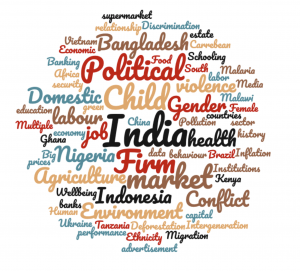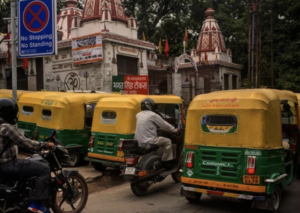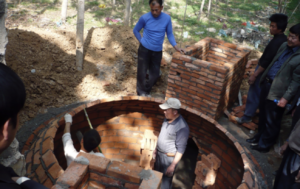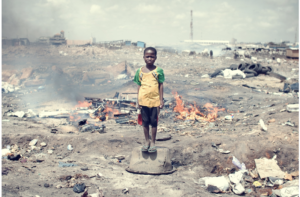Our research embraces a wide range of development issues. Members of the cluster are part of the Global Development Research Division (GDRD) at the University of Reading and conduct mainly applied research using a wide range of data including survey data, big data and archival data. We have published and supervised research students mainly in the following areas:
- Labour: We work on a range of labour market issues including gendered labour markets, wellbeing at work, migration, sex work, discrimination and child labour.
- Political Economy: We have a strong focus on the political economy of development
 including electoral politics, impact of media on political opinions, institutions and ethnic fragmentation.
including electoral politics, impact of media on political opinions, institutions and ethnic fragmentation. - Big data: We conduct research on development planning using big data analytics to help with urban planning and resource allocation. We also use online prices to Data driven decision making.
- Environment: We are interested in a broad range of environmental issues in developing countries, from natural resources exploitation, including deforestation, to the impact of environmental policy, climate change and pollution on a variety of development outcomes.
- Intrahousehold allocation of resources. We look at the intrahousehold allocation of resources in relation to child health, schooling and labour. We explore the role of women within households and their bargaining power, wellbeing, and vulnerability to domestic violence.
- Firms. We analyse the performance of financial and non-financial firms in relation to environmental policy, infrastructure, political economy factors, competition and trade.
The cluster has strong research links with the School of Agriculture, Policy and Development and the Department of Geography and Environmental Science as well as the Walker Institute as part of a wider, cross-cutting, interdisciplinary Global Development Research Division within the University of Reading. Externally, we have links with the DSA, the World Bank, the International Association for Feminist Economics and UN-Wider, amongst others.
Our Members
Research Insights
Events
Workshop: 3rd edition of The Gender Issues And Development Workshop
We are hosting the 3rd editions of the Workshop on Gender Issues and Development on November 3-4, 2025. This workshop will feature contributions in the fields of family economics, gender economics, and development economics. It aims to create a forum to discuss ongoing, cutting-edge theoretical and empirical research connecting these areas.
Our keynote speakers are BISHNUPRIYA GUPTA (University of Warwick), CLIMENT QUINTANA-DOMEQUE (University of Exeter) and CHRISTINE VALENTE (University of Bristol). A special session led by Prachi Agarwal from ODI Global will explore key issues in gender and development, including gender and trade, with a particular focus on bridging the gap between research and policy to enhance development impacts. Full programme coming soon!
Workshop: Institutions and Norms In Economic Development: a focus on India
This workshop which took place on 22 May 2024 served as a platform for speakers and attendees to delve into the intricate relationship between institutions, norms, and the economic development of one of the world’s most dynamic and diverse economies, India. How do formal and informal institutions impact economic growth, innovation, and societal well-being? How do cultural norms, traditions, and societal expectations shape economic behaviour. The workshop drew upon both historical and contemporary contexts to provide an understanding of the pivotal role institutions play in shaping economic development. See the full programme here.
News and Activities
Latest News and Activities
- External presentation: Jade Sui will present work at the Advances with Field Experiments Conference at the University of Chicago in September 2025
- External presentation: Jade Sui will present work at the World Bank/ODI Global/IFS Public Finance Conference in September 2025
- External presentation and launch of the European Development Economics Group (EDEG): Stefania Lovo led the launch of the European Development Economics Group (EDEG) at the 5th International Conference on Development Economics (ICDE) at Paris Nanterre on 2nd July 2025.
- External presentation: Neha Hui presented the paper “Caste Based Occupational Rigidity in the Context of Trade Liberalization in India” at the Royal Economic Society conference in July 2025 at the University of Birmingham.
- External presentation: Sam Rawlings presented the paper “Fertility and pregnancy loss in Sub-Saharan Africa: the role of fluctuations in local economic activity” at the Royal Economic Society conference in July 2025 at the University of Birmingham.
- External presentation: Stefania Lovo gave a keynote lecture on “Climate Change and Development: challenges and opportunities” at the 10th DENeB PhD Workshop in June 2025.
- Internal presentation: Neha Hui presented the paper “What is a Good Job: Evidence from a Conjoint Experiment in Bihar, India” in June 2025 at the internal seminar series.
- DSA Roundtable: Uma Kambhampati presented at a Roundtable at the Development Studies Association Conference in June 2025 in Bath on Building bridges: Synergies between feminist economics and development studies in times of crisis
- DSA Panel: Uma Kambhampati convened a panel at the Development Studies Association Conference in June 2025 in Bath on ‘The Geography of Women’s Labour Force Participation’, with 10 excellent presentations in the panel. A Special Issue of the Journal of Development Perspectives is expected to follow the conference.
- External presentation: Stefania Lovo presented the paper entitled: “Pollution and Agricultural Productivity–Evidence from Zambian Copper Mines” at the 2nd Development Economics Workshop (DEW) at Durham University in June 2025.
- External presentation: Jade Sui presented the paper “Information delivery and worker formalization: nationwide experiment in Jordan” Royal Holloway Spring Workshop in Behavioural Economics in May 2025
- External presentation: Stefania Lovo presented the paper entitled: “Pollution and Agricultural Productivity–Evidence from Zambian Copper Mines” at the ifo Workshop on Adaptation to Climate Change on 25 March 2025.
- Funding success: Stefania Lovo was awarded IGC funding for a unded project to assess a farm input subsidy programme in Zambia.
- Data Collection: Neha Hui and Uma Kambhampati, together with Dr Ashmita Gupta from the Asian Development Research Institute, collected primary data on aspirations, skill gaps and job task content from nearly 800 working individuals in Bihar, India, January – April 2025.
- Workshop for Access to Academy: Uma Kambhampati organised a workshop for Access to Academy for BAME PGR students as part of the Generation Delta Project, and also organised a Roundtable of University Staff in relation to admission of PGR students.
- External presentation: Jade Siu presented a seminar in the Department of Economics at the University of Lancaster in December 2024
- Funding success: Neha Hui was awarded an International Science Partnership Fund (ISPF) ODA Institutional Support Grant for the project titled ’Occupational Prestige and Skill Gaps amongst Marginalised Communities in India’. September 2024- March 2025
- Workshop on Institutions and Norms In Economic Development: a focus on India. Took place on 22nd May 2024. Find out about the full programme here.
Previous news and activities
- Unfreedom and Capitalism: Online Workshop on Economic Contributions of Slavery and Indenture. Find out about the programme and the recordings of this workshop organised by Neha Hui on 18th September 2020 here.
- Virtual Internal Seminar: Stefania Lovo presented the paper: “Renewable energy technology adoption and the diffusion of information and behaviour in social networks: Evidence from Rural China” (joint with Pan He and M. Veronesi) on 6th April 2020 at the Virtual Internal Seminar Series
- Roundtable on Climate Change, Trade and Development: On 27th March 2020, Stefania Lovo provided a keynote introduction on the links between climate change, trade and development with a focus on how climate change is expected to shape agriculture production and international trade, on the adaptation role of trade and how free trade agreements can foster technology transfer and climate change commitments. The presentation slides can be found here. The roundtable was organised and hosted virtually by the Overseas Development Institute (ODI, UK)
- Internal Seminar: Sam Rawlings and Stefania Lovo presented the paper: “Garbage in, garbage out: the impact of e-waste dumping sites on early child health” on 16th March 2020 at the Internal Seminar Series
- Internal Seminar: Neha Hui presented the paper: “Liberalism vs. individual liberty: Indentured labour in the 19th century” with Uma Kambhampati on 2nd March 2020 at the Internal Seminar Series
- Workshop on food system dependencies: Stefania Lovo co-organised a workshop in collaboration with WWF–UK and LSE Consulting on “Dependencies of Food System Transformation in the Wider Economy and Society” on 2nd December 2019. The workshop featured Prof Sam Fankhauser (GRI, LSE), Dr Max Parra (ODI) and Dr Jeremy Brice (Sociology, LSE) as expert panelists.
- Internal Seminar: Tho Pham presented the paper: “Central bank communication: More than words” on 28th October 2019 at the Interna Seminar Series.
- Research Internship: James Gregory (past UG student, and current Masters student in the International Development Department) is working with Neha Hui on a project to compile a new historical data set of indentured labour migrants from the Indian Subcontinent to British Guiana in the period from 1880s to 1910. This data set, together with other historical data sets, will be used to analyse the role of caste in the decision of indentured workers on whether to return to India after their indenture period or to settle in British Guiana.
- Ongoing grant: Neha Hui has received the British Academy Postdoctoral Fellowship for her project ‘Post Emancipation Indenture Labour Migration from India to British Colonies in the Caribbean’
- Video: talk at RES Conference 2019 on Political Conflict and Domestic Violence , April 2019, by Neha Hui
- Video: talk at RES Conference 2019 on Domestic Violence and Child Mortality, April 2019, (starts at minute 58:10) by Sam Rawlings
- Policy article: Decentralisation of Environmental Regulations in India, Oct 2018, by Stefania Lovo
- Policy article: Social media, sentiment and public opinions: Evidence from #Brexit and the #USElection, June 2018, by Tho Pham
- Oped: How Domestic Violence Against Mothers Endangers Child Health, June 2017 by Sam Rawlings
- News coverage: A BOT IN THE ECHO CHAMBER: Evidence that fake Brexit news spread by fake users helped to drive the two sides apart, April 2017, by Tho Pham




